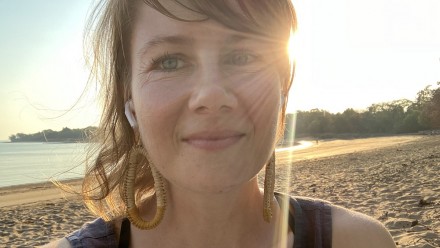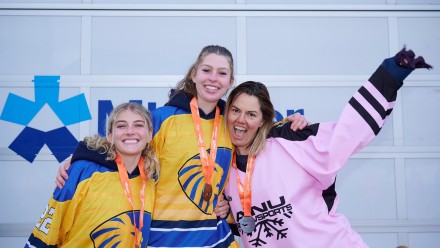International Elective: Vila Central Hospital, Vanuatu
By Clair Bannerman
In peak tropical cyclone season (mid-January to mid-February) 2023, I had the absolute privilege of undertaking a medical student elective placement at Vila Central Hospital (VCH), Vanuatu.
This elective placement included a two-week rotation with the Obstetrics and Gynaecology department, and two weeks in Emergency. This elective was generously supported by the Andrew Dent Student Elective Scholarship. My top few take-home reflections below, document my experiences and share my learnings with anyone who might take an interest.
Traditional and western medicine are complementary.
As one of only two major hospitals in a nation comprised of over 80 islands, VCH has a broad patient catchment. The ED and outpatient’s departments sport daily queues to rival the busiest of metropolitan Australian hospitals.
Indigenous ni-Vanuatu people comprise more than 90% of Vanuatu’s population and the overwhelming majority of patients seen at VCH. These Ni-Vanuatu patients hail from a vast array of backgrounds, with different languages, beliefs, faiths and cultural practices. For this reason, over the years, VCH has developed a self-asserted reputation as a centre of excellence in indigenous healthcare provision across the Pacific and prides itself for this role.
During my elective placement, I observed doctors, midwives and nurses alike demonstrate respect and consideration for both the unique cultural perspective each patient brought with them, and the role of cultural practices including “bush medicine” and “black magic” in both healing and convalescing. This included the integration of traditional medicines before, during and after commencement of western medicine interventions. For instance, many cancer patients reported a healthcare journey with complementary bush medicine and western medicine, including analgesia.
Universally, healthcare staff were supportive of patients’ efforts to engage with both traditional healing and western care, seeing the two as complementary tools to battle a common adversary.
The interface between medicine and spirituality supports holistic healthcare.
Religion is a big deal in Vanuatu; more than 80% of the population is Christian, from a range of denominations, and 15% are active members of other religions.
Each morning at VCH a devotion was held outside the ED for patients, staff and passers-by, with around 100 people participating each day. This devotion heralded the opening of the ED and outpatient’s department to the public, and involved hymns, prayers and a short sermon. In addition to the devotion, I often observed religious groups on the wards, blessing sick and injured patients to support their healing, regardless of their faith.
There is a significant body of evidence to support the role of spirituality in healing, including helping patients to feel more at-ease in the hospital environment and place trust in the care that is given by their treating team.
Back home, the model of spiritual service support I have observed in public hospitals is more intimate, consisting of individual communion or micro-congregations. While I don’t believe Vanuatu’s model of religion/healthcare integration is appropriate for the Australian multicultural context, it was enriching to experience and observe.
Ingenuity and innovation thrive in a resource limited environment.
Vanuatu is a Small Island Developing State. A significant proportion of its national revenue comes from international aid and donations—as financial and human resources, buildings and consumables—are critical for keeping the economy afloat. For this reason, VCH is a resource-limited environment, with lack of access to many tools and medications we take for granted in metropolitan Australian hospitals.
For instance: medical imaging services are limited to x-ray and ultrasound—no CT scanner is available anywhere in the country; and IV fluids need to be manually timed due to lack of syringe drivers and pumps.
However, in spite of the resource limited environment, the doctors, nurses and midwives I shadowed during my placement delivered first-class medical care, improvising however they could. For instance, I was taught how to use a rubber glove in lieu of a torniquet for venepuncture and cannulation; how to manually mix lignocaine with lubricant for nasogastric tube and indwelling catheter comfort; and how to manage a broad range of presentations with a limited assortment of available medications.
Free medical care is a godsend.
Access to a taxpayer funded emergency medical system is taken as a given in Australia. Further, it doesn’t cost patients to receive antenatal and obstetric care in a public hospital.
By contrast, healthcare in Vanuatu is not free. A visit to hospital in Vanuatu costs patients around $20 per night. A routine antenatal care appointment will set them back just under $10. For many ni-Vanuatu this represents a significant proportion of their take-home income; money that might otherwise be used for purchasing nappies, food or power.
Because of this, many of Vanuatu’s poorer residents do not have regular medical care, or present to hospital very late in their disease course.
I met many patients for whom a trip to the hospital was a big financial burden for the extended family network, and many others who felt they could not sustainably afford their post discharge medications.
While the Australian system is by no means perfect, we are lucky to have access to free, world class emergency medical care.
In conclusion, my medical student elective placement at VCH was a wonderful educational and cultural experience.
I would like to express my thanks to the Pacific Health Fund for generously granting me an Andrew Dent Student Elective Scholarship, without which this elective placement would not have been possible.














